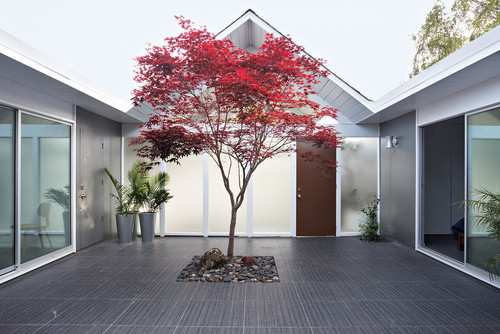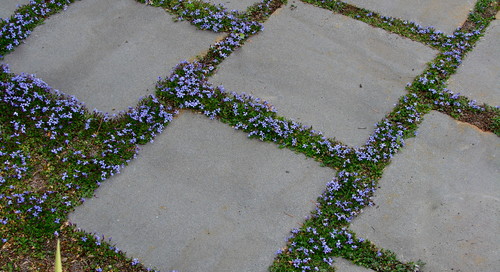Smart planting will turn even the tiniest garden into something beautiful
In association with 
By Carol Bucknell
It’s easy to get it wrong when planting up small urban gardens, going overboard perhaps and using species that overwhelm and crowd the space, or worse being afraid to plant anything. Yet plants are the best tool you can use in a garden of any size, their cost by far outweighed by the beauty, privacy and pleasure they can provide in a short space of time. Yes, in small gardens you do have to take care with plant selection and positioning, but if you get that right it’s surprising how many plants can be grown in compact spaces.
A key aspect of planting in tiny city gardens is layering and grouping low, medium and taller species together. Your plants will thrive in these combinations because they love having the protection of other plants around them to provide shelter from sun and wind as well as a steady supply of leaf mulch. Stuck for ideas? Our list of 12 best plants for small urban gardens will get you on track.
1. Crab apple
The graceful form and versatility of crab apple trees (Malus species) make them ideal for small urban gardens where plants need to be multi-taskers.
Crab apples are right on the money with their pretty flowers in spring, lovely green foliage in summer, followed by colourful fruit that the birds adore and golden leaves in autumn. Losing their leaves in winter is another positive for tiny spaces where sun at that time of year is precious.
There’s a range of flower colours, shapes and heights to choose from among the many crab apple cultivars.
More: View thousands of small garden designs
2. Japanese maple
For graceful form in a courtyard, balcony or large container you can’t beat Japanese maples (Acer palmatum). Their delicate leaves come in many colours, as do their stems, so there’s plenty to enjoy even during winter.
Shelter from wind is important for these deciduous trees and they’re not fond of very hot conditions.
Use as a focal point, in pots or against a plain wall where their stunning foliage can be seen at its best.
3. Michelia
If you’re going to have a living screen in a small city garden, why not have one that produces flowers too? Flowers provide a soft counterbalance to the built structures that surround urban properties and one of the best group of plants for taller (over two metres) flowering screens is the Michelia family.
There’s a huge variety of cultivars in this group, many related to Michelia yunnanensis pictured. Flowers range from white to soft pink and most michelias have lovely, evergreen foliage that can be loosely clipped to fit into tight spaces.
4. Murraya paniculata
Also know as orange jessamine, Murraya paniculata is the perfect screen plant for compact spaces with its vivid green foliage and white scented flowers. Easy care and disease resistant, these evergreen plants can reach 2.5 metres in height but are happy to be trimmed into lower hedges if required.
Highly fragrant small white flowers appear during spring and summer with intermittent flowering well into autumn. Murraya can be tightly trimmed as a formal hedge but most gardeners prefer a looser look to enjoy those gorgeous flowers.
TIP: For frosty gardens, try Mexican orange blossom (Choisya ternata).
5. Cycads
All gardens need focal points, no matter what their size, and architectural plants such as cycads perform this task brilliantly.
Highlight their sculptural form and graceful fronds by planting in beautiful pots or against a wall with subtle uplighting for extra wow factor.
One of the most common cycads is sago palm (Cycas revoluta) but there are plenty of other interesting plants in this ancient group to choose from.
More: Browse a wide selection of outdoor planters
6. Topiary
Sculpting plants into eye-catching shapes like these elegant cones is another way to create beautiful focal points. The ancient art of topiary has waxed and waned in popularity through the years but right now it is on trend.
For small urban garden owners, where there’s not much space for plants, potted topiary can turn even the barest of spots into a place of beauty.
More: Find a landscape designer in your area
7. Liriope muscari
When outdoor space is at a premium, limiting the lawn and planting ground covers such as Liriope muscari is a much better solution.
This low-growing evergreen perennial forms dense, grassy clumps that are covered in spiky purple-blue flowers in summer and autumn. It’s frost hardy and loves dry shade.
8. Blue star creeper
City gardens are usually surrounded by concrete, glass and other man-made materials. And in small urban gardens, a large part of the ground area is often paved for outdoor living.
One of the best ways to soften these materials is to plant ground covers such as Blue Star creeper (Isotoma fluviatilis) between pavers or as a lawn alternative. Blue star creeper is tough enough to be walked on, will grow in sun and part or full shade and tolerates dry conditions too.
9. Lomandra
Graceful grasses are another excellent lawn alternative for gardens big and small. Some of the best performing grasses around are many of the species and cultivars in the Lomandra family from Australia. Like real Aussie battlers, most will cope with sun, shade, cold, wind, drought and even damp ground.
There are plenty of different cultivars to choose from so, for optimum good looks, make sure you pick one that will be happy in the conditions of your particular site.
10. Dietes
Flowering plants need to be tough to do well in an urban environment and they don’t get much tougher than the Dietes genus.
Common names for these rhizomatous perennials include wild iris, African iris and butterfly iris and most species, including the Dietes grandiflora pictured, are from Africa. It and the creamy yellow-flowering Dietes bicolor are most often seen in gardens, but increasingly popular is the taller Dietes robinsoniana that hails from Lord Howe Island off the coast of Australia.
All can cope easily with the conditions often found in city gardens: sun, part shade, wind, cold and dry ground.
11. Rain lilies
Low-growing edging plants help create the layered look that gives small urban outdoor spaces a luxuriant, lush feel. Rain lilies (Zephyranthes candida) are wonderful edging plants with their grassy, 30 cm-high foliage and crocus-like white flowers produced during summer and autumn, particularly after rainfall.
Tolerant of light frosts, rain lilies are happy in full sun or part shade.
12. Star jasmine
You have to make use of every available centimetre in small urban gardens. Not just the ground but up fences, walls and vertical structures too.
That’s where climbing plants come into their own and there’s none better for this job than star jasmine (Trachelospermum jasminoides). Unlike many other climbers, star jasmine looks good all year round with its glossy dark green leaves and white scented flowers that appear during spring and summer. It’s also tolerant of shade, frost and dry conditions.
TIP: Star jasmine also works well as a ground cover and a hedge, if clipped regularly.








